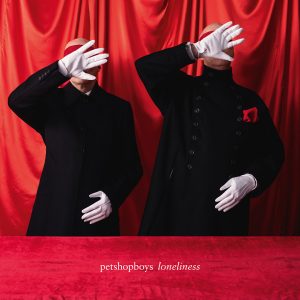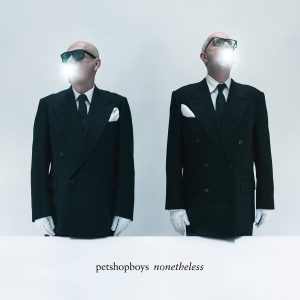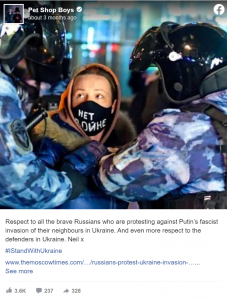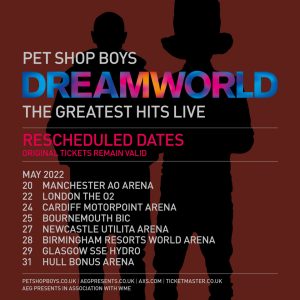On July 15th the Pet Shop Boys — the most successful (and colorful) duo in the history of UK music — will release their 12th studio album, Electric. Produced by Stuart Price (Les Rythmes Digitales, Tracques, Jacques Lu Cont), Electric is the most aggressively dance-friendly album the Boys have released in years and finds them gleefully revisiting the vibe of the early ’80s NYC club music and italo disco that inspired them to start a band in the first place (plus a cover of Bruce Springsteen’s “The Last To Die”) Now over 30 years deep into their career, the band (who have sold over 50 million albums worldwide) will once again hit the road this May to bring Electric — as well as a finely tuned arsenal of hits — to the global masses. Given their status as beloved elder statesmen of British pop music, it’s interesting to hear Neil Tennant and Chris Lowe give their take on the state of dance music (they love it) and what it means to still be making records, collaborating with other artists, and touring the world for over three decades. “It’s very cool for us,” says Tennant. ” If we had run out of musical ideas ten years ago or something, I can assure you that we would NOT now be touring as some kind of ’80s revival act. We’d simply just be doing something else with our lives.”Stereogum: Hello boys. Where are you?Neil: We are in London. Stereogum: Are you doing a ton of press for the new record? Chris: Not if we can help it.Neil: You are the first one, actually … and possibly the last. Chris: We’ll see how this goes and then decide whether or not to move forward with publicity for this album.Stereogum: Well, I’m happy to be the first one. Obviously last year was a very busy one for you — you released an album, you played shows, you performed at the Olympics — when did you find time to make another record? And how did it come to be? Neil: When we made our last album, Elysium, we had a few dance tracks leftover that we didn’t want to include on that album since it was more of a single-mood kind of thing. So we took those tracks and started working on them with Stuart Price, which is something we’d already had in mind to do, but it became a much larger project. We added a few more songs. It just became a full-fledged Pet Shop Boys dance album — which isn’t to say it doesn’t have proper songs, but it’s a little more experimental and loose in structure. It’s a collection of songs with a very strong dance bias … and a cover a Bruce Springsteen song … because, why not? Stereogum: Working with Stuart Price seems like a very natural fit. What was your working relationship with Stuart like? Were you actually in the studio together hashing out the songs? Chris: We’d worked with Stuart previously on our last tour — he mixed a lot of our music for that tour. We just tend to be on the same wavelength as him. We like the same things and tend to share the same influences — though he might say he’s actually been influenced by us quite a bit. So, we all know where each other are coming from and where we wanted things to go. It just seemed inevitable that we’d eventually work with him on a proper album. It’s also great because we can work on something here in London, then send it over to Stuart in Los Angeles. He’ll send it back to us and we’ll add a vocal, then toss it back to him. It’s very efficient, actually. Given the time difference, it’s almost like we’re working 24 hours a day. While he sleeps, we work … and by the time we go to bed he’s up and working on it. Neil: When we started the album we were working in Stuart’s studio here in London — that was at the end of last year and then again in January in February. He’s a very fun person to be in the studio with. He has the television on all day long. I don’t generally watch television, so I became shockingly well acquainted with daytime British television, which I’d never paid any attention to before. It’s all programs about people trying to buy houses in the country. Stereogum: I talked to Depeche Mode recently and we discussed the way that advancing technology had changed the way that they made music over the years — and how they were interested in getting back to working the way they made music when they first started, which included using some of the same old gear they had at the beginning. Do you find that your way of working has changed much over the past 30 years? Like you were saying, technology really allows you to work with people all over the world at any given time. Chris: Well, they kind of have to work that way because I think all the members of the band now live in different cities. At least with us, both Neil and I live in the same city. I think it’s good for us to be in the room together, really. Strangely, I don’t think the way that the two of us work has changed much at all over the years. Of course, technology has changed, but not the way we make songs. In fact, we probably work more now in the way that we did at the very beginning, since technology has also gotten easier to manage and we can do it mostly ourselves. There was a time during the middle period of the band when the technology became really unruly and we kind of needed people around to help us. Now we can really just do things with the two of us, which is generally how it is when we’re writing. We’ve always used the simplest means possible when we make demos for the songs. We’re not the most amazing programmers, but the idea is just to get the song down as quickly as possible before you lose any of the ideas. Stereogum: Elysium was, in many ways, a very subdued record. Is Electric kind of a reaction against the last one? Neil: Yeah. It’s not totally a reaction against the last one because we wrote some of these songs at the same time we wrote that album, so we always had in mind to move forward with these songs, but I’m not sure we knew exactly what it would become. It’s certainly a very different-sounding album. I’m very proud of Elysium — I think it’s a very beautiful album — but this one is much more “banging” as they say. Chris: There have always been two very distinct sides to the Pet Shop Boys. There are the more reflective, atmospheric, moody things — which are actually what most of our earliest hits really were like — and there are the more upbeat, dance-oriented things. Sometimes when you are lucky you can get both sides of us in one record. A song like “West End Girls” really is a combination of both. Neil: There’s a track on this record called “Thursday” of which you could say from the same group who brought you “West End Girls.” It has that same sort of sound and atmosphere. Stereogum: I really loved your last record in particular, but I think it’s just that gothy teen inside of me — I’m always drawn to the moody stuff.Neil: That album really works as a whole. We set out to make a beautiful album with Elysium … though, this album is not without beauty. We can’t help ourselves.Chris: They have very different themes as well. That last album was about being old and all that … whereas this album is all about rediscovering your youth. It’s about finding out what is was about being young that you actually enjoyed. Stereogum: Did you have that theme in mind the entire time or did that sort of reveal itself as you were writing the songs? Chris: Well, we’ve never really lost touch with our younger selves. Quite tragically, we still go out and try to find excitement in nightclubs. I don’t think we ever really lost that desire … (laughs) I’m sorry, what was the question? Neil: Don’t worry, you’ve answered it. Stereogum: You’ve just announced a whole slew of tour dates. I know in the past you’ve played live in a lot of different ways — from big, theatrical extravaganzas to very stripped down, minimal productions. Are you excited about touring? And do you enjoy it? Neil: I’d say that over the past ten years or so we’ve become a much better touring band and a much better live act than we ever were before. Now, really, we tour to some extent every year. Putting together a new tour production is always a very involved but very interesting process. With this tour we’re working with Stuart on the music and the visuals are very driven by the feel of the Electric album. It’s very dancey. Less ballads. And the visuals really aim to amplify that sound. Lots of lasers! We always view the live show as a performance — something with a beginning, middle, and end — and with the last tour Stuart Price had the idea of making the show almost like a medley — all the songs kind of bleed together. The idea was to make something that kind of just explodes in front of you and then flashes past. It’s very exciting.Stereogum: I know people generally hate it that everything they do in public is immediately uploaded onto YouTube, but I couldn’t help but watch some footage of you guys performing recently in Mexico. The visuals look fantastic. Neil: The live show we will be doing has actually evolved somewhat from those shows in Mexico. Those shows were quite exciting though. I was terribly, unbelievably nervous and there were all these voices chanting Pet Shop Boys, Pet Shop Boys! I just had to remind myself not to get too overwhelmed …I’ve got too many words I need to remember. It was a wonderful place to kick off the touring. Chris: We’re getting better and better as a live act. After thirty years, we’re actually really good at it now. Stereogum: You also have such a huge back catalog of material. I would imagine it might be tricky trying to balance the new with the old. Neil: Yes, but it’s also fun. You know that you want to please yourself, but you’ve also got your hardcore fans and then your casual fans. Also, our audience differs around the world. In Mexico our fans are much younger than they are in, say, Germany. I’ll be interested to see how audiences react to this show. We’ll play a song like “I’m Not Scared” — which we haven’t played since 1991 or something — and a song called “Fugitive” from a couple of albums back. Those are deep cuts that are sort of for the real fans. You don’t want to just only play hits. We are lucky enough that we could do a show and only play the hits, but that would be boring. When I go and see someone live, I don’t need to necessarily hear all the hits. If David Bowie were to play live again, I don’t need to hear every hit one after the other. I’d love to hear “Sweet Thing” from Diamond Dogs ; I don’t have to hear “Rebel, Rebel” or “Suffragette City.” I think it’s the same with us. Also, like Chris was saying earlier, there are different kinds of Pet Shop Boys songs … and we try to make sure that both sides of our catalog are represented as well. Stereogum: It’s a lucky dilemma to have. There aren’t a lot of bands out there with careers that span three decades that still have an evolving fanbase that is eager to hear the new music as well as the old. It’s a rare feat, I’d say. Neil: It’s very cool for us. If we had run out of musical ideas ten years ago or something, I can assure you that we would NOT now be touring as some kind of 80’s revival act. We’d simply just be doing something else with our lives. We would have moved on. Really, the making of new music is what fuels and re-fuels an interest in the old songs…and being able to see the through-line of continuity within all the work and how both the new material and the old somehow tie together. We’ve always just really loved the process of writing songs and recording albums and then choosing remixers to work on the songs — we love all that stuff. Our love for that has never dimmed, it has never felt like chore. I can assure you that if it had ever felt like a chore, we are lazy enough to have given it up. We both still have the constant impetus to go into a studio and make songs. Sometimes I wake up in the morning and Chris has sent over three or four demos that he’s made the night before at home in his studio … It remains one of the constants in both of our lives. We do it for pleasure, really. That’s how we started … we started making music together as a hobby and it just kind of took off from there. It never ceased to have that playful element … and I think it’s really important to stay connected to that childish, playful element to making music. Some people cut themselves off from that when they become a “grown up”… and when you do that, you generally cut yourself off from your own creativity. Chris: We’re also still enormous music fans as well. We follow everything happening in popular music and are constantly being asked about it. People want to know what we think of the new Daft Punk single. It’s an issue for us. (laughs)Neil: Oh, more than an issue. I mean, is there anything more important right now than that that Daft Punk single?!Chris: I’m always very inspired by sounds. Whether it be Brazilian music or the Spanglish radio stations in LA — or even hearing dubstep for the first time — I’m always intrigued by interesting new sounds and they way they filter through popular music … or by how different cultures do their own take on what is “dance” music or “electronic” music.Neil: In the ’80s we were always fascinated by how South American bands would do their own weird take on Depeche Mode. You’d have these singers with very heavy accents singing like Dave Gahan. They had very deep voices … and they were apparently miserable.Chris: What a great era that was. (laughs)Neil: One of the things I love about the Electric is that there are bells — literally, bells — on almost every track. We hadn’t used sounds like that since the early ’80s. It reminds me of New York in 1981 or 1982 — the sound of it.Chris: I’d imagine Madonna doing the “Dress You Up” dance to this music. Neil: Actually, our choreographer didn’t know of the “Dress You Up” dance and I had to find the video online and show it to her.Chris: Why didn’t you just ask me? I could have just shown it to you.Neil: Don’t joke, we might find ourselves doing it on stage soon. (laughs)Stereogum: You guys are such pioneers in regards to bringing dance music to a much wider audience. How do you feel about the current state of electronic music? Neil: Any time we’re putting out an album invariably someone will say to us, “It’s good that you have a new album coming out because electronic music is getting really big right now!” They’ve been saying that to us since the ’80s. But this time it really has kind of taken over with all the EDM stuff … I think it must be dance music’s biggest moment in America since disco.Chris: Until America turns again, like it usually does.Neil: It will. It’s only a matter of time until all the dance music gets run over again by a bunch of ghastly rock bands. There’ll be another grunge.Chris: It can be like when people burned all their disco records … but what would you burn? You can’t publicly go out and destroy a download or a digital file. Neil: There would have to be a symbolic burning — people going out in public and wiping their iTunes library for everyone to see. Stereogum: You performed at the Olympic ceremony in London last year. How was that experience for you? It must hav been nicely validating to be out there with all the other royalty of British pop music. Was that a kind of “full circle” moment for you? Chris: Well, it was short … we were on for two minutes and six seconds.Neil: It was exciting. I don’t know if it was a moment of things coming full-circle, but it felt genuinely exciting to be a part of something that was a global event. Backstage there was a really amazing atmosphere — all these British pop stars running about. You had One Direction chatting with Madness and Annie Lennox talking to the Spice Girls…Chris: Whilst doing yoga. Neil: Oh yes, while she was doing yoga. George Michael watching Absolutely Fabulous on a mobile television while someone from Queen chats with Pete Townsend nearby. Everyone was quite lovely, really. Chris: The whole thing was quite amazing for London. The atmosphere in the city was so nice and so friendly. It felt nice to be a part of something so good.Neil: It also felt good to be a British pop star there. With both the opening and the closing ceremonies, it was great to see that one of the best ways to celebrate our country was to simply point out all the astonishing music that our country has managed to produce in the last 50 years or so. They could have done even more had there been time. It felt very good to celebrate Britain’s musical culture. And when we came out wearing our pointy hats and riding on rickshaws…I liked the fact that we were arguably the most “arty” part of the entire thing. Actually the designer of the closing ceremonies was also the designer of our tours. We just had to wear the pointy hats and the Gareth Pugh suits. When the opening bassline of “West End Girls” started to play and the entire stadium recognized it — it was a strangely transcendental moment for us — and then suddenly it was over. And everyone in the world saw it, which was amazing. And in the opening part of the ceremony China actually marched in to “West End Girls” … one of the biggest nations in the world was walking to our song.Chris: … which is funny because most of our music is censored in China. Stereogum: One last bit of trivia I wanted to ask you about. There’s a magazine in Australia that occasionally asks me to write about records that I consider to be lost classics; these overlooked gems that I think people should revisit. For their next issue I’m writing about Results, the album you made with Liza Minnelli in 1989. What are you thoughts on that record … and the making of it? Neil: It was great fun making that record. Like so many things we’ve done, that just came out of the blue. We just got a call asking if we’d like to work with Liza Minnelli. We went to meet her at this hotel and walking down the hallway to her room Chris and I were just overcome with the giggles. I mean, it was LIZA MINNELLI. People might now realize it, but when I was a teenager Cabaret was just as important as David Bowie. Cabaret, A Clockwork Orange, David Bowie and Roxy Music — that was it. Maybe Lou Reed was important as well. So anyway, we get to the door and Liza Minnelli opens the door and we just immediately burst out laughing. We laughed, then she laughed. It was quite a brilliant beginning, actually. She was touring at the time with Frank Sinatra and Sammy Davis, Jr. — both of whom we met. She just went with it — she did everything we suggested. She wanted to make an electronic pop album and that’s what we did. We wrote the songs bearing in mind that she would sing them and taking into consideration her onstage persona. It was wonderful. I think it holds up quite nicely. It’s got this very cult following, that record. It was reissued about five years ago and people often ask us about it. Trevor Horn used to keep a copy of it in his car and listened to it all the time.Chris: I listened to it the other day, oddly enough. I was going through some old CDs and decided to give it a listen. Our take on “Twist In My Sobriety” for her is quite good, isn’t it? Neil: Oh yeah. A bit hip-hoppy, isn’t it? Stereogum: You’ve had the opportunity to collaborate with so many amazing people, particularly Liza and Dusty Springfield. Were there other collaborations you wanted to do that never came together? Or any current dream collabs? Neil: Well, we always wanted to make a record with Nina Simone. Chris: She didn’t have a reputation for being difficult at all, did she?Neil: She certainly didn’t. But I think she despised us. She had no time for us, and who can blame her, really? Chris: She was fantastic. I went to see her play once and she had a temper tantrum. She slammed the lid down on the piano and left the stage. The evening ended with a slow hand clap from the audience … until people slowly walked out and there were only about two of us left in this empty auditorium. It was brilliant. Stereogum: Aside from the release of Electric and a whole slew of tour dates, what will the rest of this year be like for you? Neil: Touring. We start in Chile and then go to America and Russia and Europe and … all over the place, really. Southeast Asia, North America, South America. Chris: Our last tour lasted about three years. So once it starts you really never know when it will end. Neil: We’ve also been writing a piece about Alan Turing — the English mathematician and code-breaker. He basically invented the modern idea of the computer — something called the “universal machine” — during the 1930’s and 1940’s. He also helped break the code that ultimately helped us win the war. He was also openly homosexual, but rather than send him to prison — which could be done in those days — he was given female hormones, which made him grow breasts. He ultimately killed himself. It’s an amazing though also very tragic story. We’ve written this piece that is comprised of eight different sections depicting scenes from his life. It’s very unusual because it’s for spoken voice, electronic instruments, and an orchestra. We performed a section of it last year called “He Dreamed Of Machines,” but we just finished the entire thing and I think it’s going to premiere next summer. It’s a very different thing from anything else we’ve ever done. It’s a tribute to him, really. He’s never been pardoned. He was prosecuted and convicted of homosexuality and gross indecency, but he’s never been pardoned. The previous Prime Minister apologized, but he’s never officially been pardoned. There were thousands of gay men who were sent to prison for homosexuality. I think they deserve to have the stain of conviction removed from their memory, which was another impetus for doing the piece. Stereogum: That’s a lot going on.Neil: I know. The last two years have been very productive writing periods for us. I think now — with this tour starting — we won’t be in the studio much. It’s good to also have phases where you don’t write anything and just focus on performing.Chris: And with that bombshell, we have to go. (laughs)Neil: Thank you!
Taken from: Stereogum
Interviewer: T. Cole Rachel





